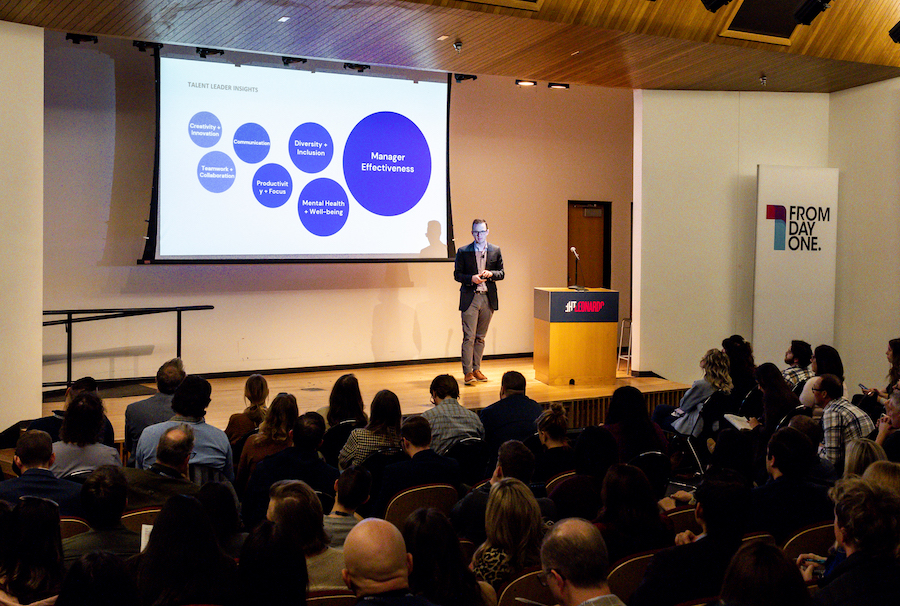Collective Efforts That Create a Workplace Community


To kick off his thought leadership spotlight for the From Day One conference in Salt Lake City, Steve Artnz, co-founder and CEO of Campfire, a Utah-based leadership development company, invited the room to close their eyes.
“We’re going to check in with ourselves,” he said, and asked three questions:
1. What are you feeling today?
2. What are you thinking about or distracted by the most today?
3. Who are you today?
“Now, think of someone on your team and go through the same three questions,” he said.
30 seconds later, eyes open, he explained that we’re blocked from making meaningful connections by the language we use.
“Notice I didn’t say ‘How are you’ or ‘How are you feeling,’” he said. “If the person on the other side of the Zoom can’t empathize, you’ve got some big challenges in your workplace. We have to know how to check in and get to know [who our coworkers] are.”
You can’t start diving deep in conversation if you’re stuck in generalizations, though—something Artnz says we do both at work and in our everyday lives.
“I’m going to describe all of the salespeople that you’ve ever worked with,” he said. “They all love sports, sports all the time. They love to close—it’s their favorite thing about their job. And they’re absolutely driven by money; it’s all they want.”
His exaggeration of the boxes we’re prone to put people into is met with bashful laughter. But he goes a step further, into the real research.
“I [sat down with] 200 salespeople, and only 20% of them ended up with money and rewards in their top six of [drivers],” he said. “They’re motivated by mission and vision, purpose, problem solving, collaboration, teamwork…all these things matter as much to them as they matter to us. Turns out, they’re human too.”

But even with a change in perspective and improved conversational techniques, Artnz posits that you’ll be walking in place unless your company’s environment instinctively fosters this kind of connection.
“Raise your hand if you work at a company that you would describe as ‘an engine for your mental health and well-being,’” he said. To a few hands, he said, “Some, but not a lot, right? Are we doing the things that we need to [achieve that]?”
Campfire takes its name from the “warm, connected gathering place” friends and family make s’mores over.
“Somehow you just feel safe, sharing stores and thoughts, ideas and mistakes, challenges, lessons learned, all of these sorts of things from the deepest part of your life,” he said. “How do we create that campfire culture at work?”
It falls on all of us to develop that culture collectively, making honest efforts to know and understand the people we work with. The most efficient culture changes, though, start at the top.
“We’ve learned throughout the pandemic how critical the manager role has become,” he said. “If you take a company that’s become successful and exploded in growth, at some point, they will hit a ceiling if their management is ineffective.”
The expectations of managers have risen since the start of the pandemic, he says. What might be tagged as “soft skills,” he says, are anything but.
“They’re not soft conversations, they’re hard,” he says. “‘What do you expect of me as your leader? Here's what I expect of you.’ We need to have conversations about career development, ones that provide direction and clarity.”
When these conversations are informed by his earlier three questions Artnz asked initially, he says “your company will grow, see success and achieve results.”
The reverse is also true, though.
“If we don’t do this, people will leave,” he says, referencing a McKinsey & Company study on the Great Attrition. “The biggest reason that [people quit] during the pandemic was uncaring leaders. [We need to] make people feel seen. In a post-AI world, we really need to focus on what makes us human.”
In closing, he invited the audience to get a head start on that.
“Please pull out your phone and text someone on your team, in your family, [whoever]: ‘How are you? (honest answers only),” he said. “I promise you’ll enjoy the results.”
Editor's note: From Day One thanks our partner, Campfire, for sponsoring this thought leadership spotlight.
Jacqueline is a writer and Master of Accounting graduate from the University of Utah. Specializing in tax, she's interested in business, government, and the intersection of the two. When she's not in Excel or writing, she loves to run, play Candy Crush, and read novels.
The From Day One Newsletter is a monthly roundup of articles, features, and editorials on innovative ways for companies to forge stronger relationships with their employees, customers, and communities.